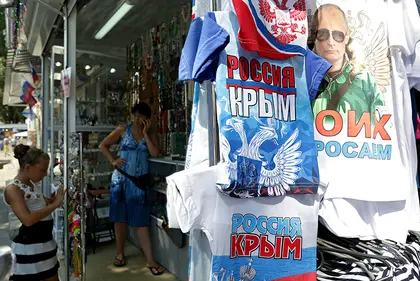“The de facto authorities in Crimea have limited free expression, restricted peaceful assembly, and intimidated and harassed those who have opposed Russia’s actions in Crimea,” the report published on Nov. 17 says.
In the wake of the EuroMaidan Revolution that ousted Ukrainian President Viktor Yanukovych on Feb. 22, Russia sent its troops into Crimea, taking control of the mainly ethnic Russian territory that is home to five percent of Ukraine’s population. After a flawed referendum denounced by Ukrainian and Western leaders, Russia officially annexed the city of Sevastopol and the Autonomous Republic of Crimea that make up the Crimean peninsula.
JOIN US ON TELEGRAM
Follow our coverage of the war on the @Kyivpost_official.

Ukraine has maintained its claim to Crimea, referring to it as “temporarily occupied,” while Russia has put groups that support Ukraine’s claim to Crimea and oppose Russian rule under increasing pressure.
The report focuses on the persecution faced by Crimean Tatars and pro-Ukraine activists remaining in Crimea, repressive measures used to silence media critical of the Russian state and mechanisms used to pressure Crimeans into becoming Russian citizens.
Crimea has been subject to less international attention than separatist-held areas of the Donetsk and Luhansk oblasts because since the Russian military forced Ukrainian forces to leave there have been no clashes. Because Russia insists that Crimea is now part of Russia observation missions like the Organization for Security and Co-operation in Europe’s Special Monitoring Mission in Ukraine are not allowed to operate there.
Crimean Tatars have been prominent targets of repressive measures because of their opposition to Russian rule of Crimea. The Crimean Tatars were one of many Soviet minorities deported to Siberian and Central Asia during World War II on falsified up charges of Nazi collaboration. In the subsequent decades they have struggled to return to their homeland.
Currently there are some 300,000 Crimean Tatars living on the Crimean peninsula. Human Rights Watch says anti-extremism legislation is currently being used to target and intimidate them.
There have been 15 cases of abductions or disappearances of Crimean Tatars or pro-Ukraine activists since March 2014. Six of those people were later released and two Crimean Tatars were later found dead.
One of those killed was Reshat Ametov,a Crimean Tatar who was escorted away from a protest in Simferopol by three men in military clothing on March 3. He was later found dead. Another Crimean Tatar, Edem Asanov, disappeared on his way to work in Simferopol on Sep. 29 and was found six days later hanged in an abandoned building.
The so-called self-defense units have been implicated in many of the disappearances and instances of harassment. Human Rights watch says the groups work independently of the police and complaints to the police about the groups go unanswered.
On May 6 Adburaman Egiz, a member of the Crimean Tatar self-governing body the Mejlis, was approached by members of a self-defense unit who demanded he show them his documents, according to the report. Egiz refused, saying he did not know who they were and asked them to call the police. Instead they called in more men from self-defense units. They proceeded to beat him before eventually checking his documents. Egiz filed a complaint with the police but was told on May 8 they would not pursue the case because of “lack of criminal actions.”
In July a bill was introduced in the Crimean Parliament to grant members of self-defense units amnesty from February until April 2014. A similar law in the Russian Duma would grant members of the units amnesty through January 2015.
Media in Crimea has also been under pressure. All media outlet are required to re-register providing an opportunity to deny new registration to outlets critical of the Russian government.
Lilya Budzhurova, deputy director of ATR, the only Crimean Tatar television station, which broadcasts in Crimean Tatar, Ukrainian, and Russian, told Human Rights Watch they had started self-censoring to try and keep their registration. “We want to continue working so we started self-censoring where we can: for example, we avoid using certain words and phrases, such as “annexation” or “occupation’ of Crimea,” she said.
Crimeans wishing to continue living in Crimea as Ukrainian citizens have also faced hurdles. The deadline for registering Ukrainian citizenship with Russian authorities was April 18 after which point Russia considered anyone who had not registered to exclusively be a Russian citizen.
According to local residents and rights monitoring groups there were only four offices that could register Ukrainian citizenship with reports that long lines meant people were not able to be seen before the deadline expired.
You can also highlight the text and press Ctrl + Enter




